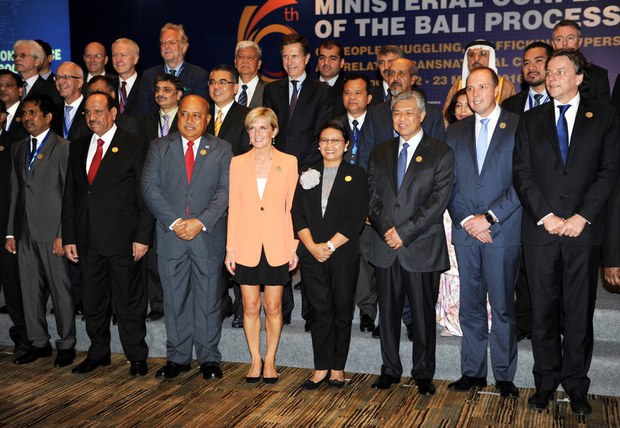Indonesia, 44 Other Nations Agree to Respond Quicker to Irregular Migration Crises
2016.03.23
Jakarta
 Australian Foreign Minister Julie Bishop (front row, fourth from left) and Indonesian Foreign Minister Retno Marsudi (front row, fifth from left), co-chairs of the Bali Process on People Smuggling, Trafficking in Persons and Related Transnational Crime, pose with officials from other countries in Nusa Dua, Indonesia, March 23, 2016.
Australian Foreign Minister Julie Bishop (front row, fourth from left) and Indonesian Foreign Minister Retno Marsudi (front row, fifth from left), co-chairs of the Bali Process on People Smuggling, Trafficking in Persons and Related Transnational Crime, pose with officials from other countries in Nusa Dua, Indonesia, March 23, 2016.
Ministers from 45 countries who met in Indonesia this week to discuss human trafficking agreed that they had to prepare better for sudden influxes of migrants and refugees, and address root causes of irregular migration.
The Sixth Ministerial Conference on the Bali Process on People Smuggling, Trafficking in Persons and Related Transnational Crime ended Wednesday in Bali with member-states agreeing to implement a mechanism for responding more quickly to and consulting one another over future crises.
They also agreed to conduct a review of last year’s irregular migration crisis in Southeast Asia –which saw thousands of stateless Rohingya Muslims from Myanmar and Bangladeshi migrants come ashore in Indonesia and Malaysia – in order to figure out what went wrong and how to improve their responses to large-scale influxes.
“Ministers agreed the review would consider options for improving national, regional and subregional contingency planning and preparedness for potential large influxes of irregular migrants in the future,” the conference’s co-chairs, Indonesian Foreign Minister Retno Marsudi and Australian Foreign Minister Julie Bishop, said in a statement at the end of the two-day meeting in the Balinese town of Nusa Dua.
“Ministers further acknowledged the need for more agile, timely responses by Bali Process members,” the co-chairs added.
Unprecedented declaration
The Bali Process was started in 2002 so nations could work with another to develop strategies for combating people-smuggling in the region. Its members also include Myanmar, Bangladesh, India, Thailand and Malaysia.
And for the first time in its 14-year history, the grouping’s member-states on Wednesday issued a non-binding Bali Declaration, in which they pledged to keep working together to respond to increasingly complex migration crises.
According to the declaration, the international nature of irregular migration required a comprehensive approach based on collective responsibility, while respecting the sovereignty and national interests of Bali Process members.
“We underline the need to address the root causes of irregular movement of persons and forced displacement, and the frequent linkage between the breakdown of good governance and the ease of people smuggling and irregular migrant ventures,” the declaration stated.
“Our collective response should promote good governance, rule of law, full respect for human rights and fundamental freedoms, a sense of security and belonging and inclusive economic growth,” it said.
According to Retno, the Bali Process seeks to protect migrants and victims of transnational crime through supporting efforts to solve the problem of human trafficking, including through community-based initiatives, said Retno, Indonesia’s top diplomat.
“Criminal and human trafficking still occur, while refugees and asylum seekers continue to arrive, so those make complex, major problems,” Retno said.
Bishop, her Australian counterpart, said members had agreed to work together to find long-term solutions for migrants and refugees. Members also were encouraged to pursue criminal charges against human traffickers.
“This landmark Ministerial Declaration strengthens regional cooperation and determination to combat these shared challenges,” Australia’s Ministry of Foreign Affairs said in a statement issued Wednesday.
Australia has been criticized lately for its policy of turning back boatloads of migrants and refugees heading for its shores. Last week, Canberra celebrated its 600th consecutive day of not allowing boats full of asylum seekers and migrants to reach its shores.
2015 crisis
During last year’s irregular migration crisis in the Andaman Sea, foreign ministers from Malaysia, Indonesia and Thailand met to discuss the large inflow of refugees from Myanmar and undocumented migrants from Bangladesh.
The crisis started in May 2015, when some 3,000 people from the two countries were rescued from human-smuggling boats after the vessels were forced to sail farther south. This resulted from Thailand simultaneously launching a maritime blockade on such boats and cracking down on human trafficking.
The crackdown stemmed from the discovery of the graves of 32 undocumented people at abandoned traffickers’ camps along Thailand’s border with Malaysia.
Thailand went on to arrest 90 people suspected of being involved in a transnational ring connected to those camps in the jungle. On March 15, the trial of the 90 suspects, including a former three-star Thai army general, opened in Bangkok.







